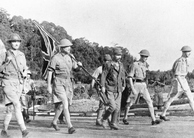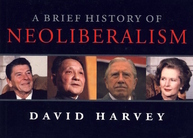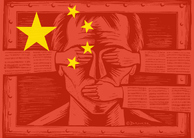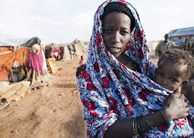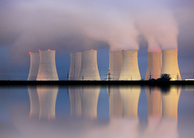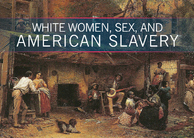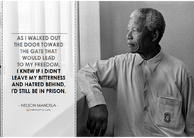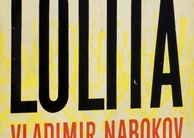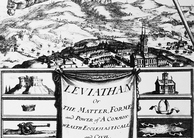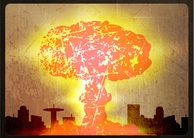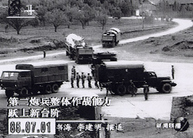|
Power (tagged articles)
The keyword Power is tagged in the following 45 articles.
2021, Vol. 13 No. 10
Early medieval Irish society operated on an elaborate Power structure formalized by law, practiced through social interaction, and maintained by tacit exploitation of the lower orders. This paper investigates the materialization of class hierarchies... Read Article »
2021, Vol. 13 No. 05
Foucault raised the concept of bio Power in the first volume of The History of Sexuality and placed its emergence in the context of capitalism, but he did not fully tackle the relationship between bio Power and capitalism. In this article, the author... Read Article »
2018, Vol. 10 No. 10
The following paper seeks to elucidate the complex processes involved in the Mexican State’s loss of authority and the subsequent acquisition of this authority by armed criminal groups operating in that country. In theoretical terms, this... Read Article »
2017, Vol. 9 No. 10
As a topic of philosophical interest the Socratic dialogues play a pivotal role in many of Plato’s works of more than thirty authentic dialogues. This paper discusses pederasty and Power through myth and story-telling to teach Ancient Greek... Read Article »
2017, Vol. 9 No. 10
The United States government started exploring the soft Power potential of student and scholar exchange programs as early as 1908, with the establishment of the Boxer Indemnity Scholarship Program.[1] The father of the theory of soft Power, Joseph... Read Article »
2017, Vol. 9 No. 04
Since the end of the Second World War, scholars of British military history have busied themselves with attempts to explain the British defeat at Singapore to Japan in February 1942. Research reveals that there existed what Peden has called an &... Read Article »
2017, Vol. 9 No. 04
The relationships between Power and rhetoric have been the subject of many recent studies, most notably from the conversation concerning “critical rhetoric” (McKerrow, 1989; Murphy, 1995; Ono & Sloop, 1992; Shugart, 2003; Zompetti... Read Article »
2016, Vol. 8 No. 11
The so-called Islamic State of Iraq and Syria (ISIS) – also known as ISIL, IS and Daesh – has during the last years disseminated videos throughout the Internet in a new recruitment and media strategy focusing on the destruction of cultural... Read Article »
2016, Vol. 8 No. 05
As a founder of sociology, Max Weber influenced the social sciences immensely. In his “Politics as a Vocation,” Weber claims that one of the definitions of the state is its ability to employ legitimate violence as a means of control... Read Article »
2016, Vol. 8 No. 02
Michael Thompson, reviewing A Brief History of Neoliberalism by David Harvey, calls it ‘the world according to David Harvey’ (2005). This is an accurate remark: although erring slightly on the side of conspiracy, the book is a breathtaking... Read Article »
2015, Vol. 7 No. 10
Headlines are littered with the rhetoric of the Powerful. The most present modern crises can ostensibly be reduced to deconstructed, decontextualized and digestible echoes of our world leaders. The Syrian case is not disqualified from this reductionist... Read Article »
2015, Vol. 7 No. 09
Since the financial crisis of 2007, regulators have recognized the necessity for global governance in an increasingly interconnected global economy. Many have praised the extent to which regulators have already minimized the damage of the crisis... Read Article »
2015, Vol. 7 No. 09
In contemporary China, as a result of centuries of censorship, major dissent at the domestic level has become rather rare. This research paper examines the mechanics of censorship in China. It will explore the evolution of censorship over time as... Read Article »
2015, Vol. 7 No. 08
“Not all silences are equal,” writes Michel-Rolph Trouillot (1997, p.27). Not everyone, I add, possesses the Power to silence a person or a group of people. In this research paper, I use gender as an analytical tool to examine the way... Read Article »
2015, Vol. 7 No. 05
Their protest challenged the paradigm of Power as it existed at the time, specifically by revealing the limitations of the state's ability to exercise its will even in a situation where the state wielded seemingly absolute authority.[1] Power, as... Read Article »
2014, Vol. 4 No. 1
In the case of Japan, which lacks any significant fossil fuel reserves (Gasparatos & Gadda, 2009, pp. 4038-4048) some alternative forms of energy production have been implemented. Japan has implemented alternative energy options such as nuclear... Read Article »
2014, Vol. 6 No. 06
UNAIDS reports the antenatal HIV prevalence rate—the prevalence of HIV in unborn children—to be approximately 38% in Swaziland, Africa (UNAIDS 2012), the highest rate in the world (Root 2010). Diagnosed through an HIV antibody test or... Read Article »
2012, Vol. 3 No. 2
This study examined the scope of influence that Japanese anime had on American people born in the '80s and '90s. Relying on secondary research and a survey using a convenience sample of 107 students and young adults, this study found that anime... Read Article »
2013, Vol. 7 No. 1
South Korea, also known as the Republic of Korea (ROK), is a remarkable country in many ways. It survived the Korean War, supported by American military assistance. It successfully transitioned to democracy after nearly 40 years of authoritarian... Read Article »
2013, Vol. 3 No. 2
Women’s advancement in the corporate workplace has taken significant strides over the last century. Research demonstrates, however, that despite an increased presence of female employees in mid-management positions, executive positions continue... Read Article »
2013, Vol. 5 No. 09
This article aims to investigate the effects of moderators such as culture, Power dynamics and political factors on the negotiation behavior and processes displayed in a dyadic, geopolitical negotiation scenario by using a hybrid model of well-established... Read Article »
2013, Vol. 5 No. 08
There is ample evidence of sexual relations, from rapes to what appear to be relatively symbiotic romantic partnerships, between white slave masters and black women in the Antebellum South. Much rarer were sexual relations between white women and... Read Article »
2013, Vol. 5 No. 03
This essay examines the first black winner in 2012 on Idols SA, Khaya Mthethwa (Appendix 1), the TV format of the Idol brand, and the social construction of racialized vision in the context of South Africa as a post-colonial nation from a visual... Read Article »
2013, Vol. 5 No. 02
Of the three states in the South Caucasus, Georgia has experienced the most political instability since the collapse of the USSR. Some scholars even described the country in the immediate aftermath of independence as a failed state. Despite the... Read Article »
2012, Vol. 2 No. 1
The last decade of American military policy has been dedicated to fighting an enigma – how to wage war against an enemy that does not think, act, or fight like we do; an enemy that wears no uniform, utilizes any tactic, and swears its allegiance... Read Article »
2012, Vol. 2 No. 1
Over the past 20 years, the international order has been characterized by the conflict between the United States' desire for isolationism and its desire to maintain hegemony. While the United States has initiated and continued wars in Afghanistan... Read Article »
2012, Vol. 4 No. 09
When on September 24th, 2011 Russian prime minister Vladimir Putin announced his bid to run for president in the presidential elections in March 2012, a supposition in Russia's political regime was confirmed that many observers suspected would... Read Article »
2012, Vol. 4 No. 09
Limits lie at the heart of the American political system. No governmental body or figure has unlimited authority—all are checked by the others. However, beyond this, political thinkers are divided over how best to mitigate majoritarian influence... Read Article »
2012, Vol. 4 No. 08
Nelson Mandela once said, "You can never have an impact on society if you have not changed yourself." This quote is particularly applicable to the field of energy, and the transition from an unsustainable fossil fuel consuming world, to one based... Read Article »
2011, Vol. 2011/2012 No. 1
It was commonplace among academics of the 1970s to share an understanding of the frozen nature of international relations during the Cold War period, and to hold similar assumptions about the fixed character of the nation-state and the importance... Read Article »
2011, Vol. 3 No. 05
In Vladimir Nabokov's Lolita, the overriding force of the narrator, Humbert Humbert, is his need to prove himself master of everything: other people, his own desires, fate, and language itself. Time and time again through Lolita we see Humbert&rsquo... Read Article »
2011, Vol. 3 No. 02
American women have struggled historically against certain paradigms of inferiority that all women experience. The female identity is different according to each culture and their customs, but many cultures are based on a patriarchal past where... Read Article »
2011, Vol. 2010/2011 No. 1
The European Union (EU) is rarely seen as a Powerful actor on the international relations stage. A statecentric, ‘high politics’ view of global politics tends to overlook the involvement of the EU and its effectiveness, 2 and the dominance... Read Article »
2010, Vol. 2 No. 12
In his seminal text, Leviathan, the philosopher Thomas Hobbes offers what was then a radically novel conception of the origins of civil government. Hobbes’ ideas of the commonwealth are predicated upon his views of human nature and the state... Read Article »
2010, Vol. 2 No. 05
Power is the ability to achieve one’s purposes or goals.[1] Through the scholarship of Joseph Nye, the concept of Power occupies two distinct spheres: ‘hard’ and ‘soft’. The former purports to have a coercive function... Read Article »
2010, Vol. 2 No. 05
Long held as one of the most prized executive Powers, the presidential veto in American politics grants the sitting president the Power to unilaterally halt any piece of legislation. Though the word “veto” does not appear anywhere in... Read Article »
2010, Vol. 2 No. 03
With over 20% of United States Power production being of a nuclear nature, and all of this nuclear production generating high-level nuclear waste, the US has already accumulated large quantities of volatile nuclear waste and will only have more... Read Article »
2010, Vol. 2 No. 01
From before its birth to the present, the expansion of US Power has been analogous to an ever-expanding hand upon the globe. Despite some of today's historically inaccurate politicians citing a revered past of non-interventionism and isolationism... Read Article »
2010, Vol. 2 No. 01
On April 6, 1994, the Hutu[1] president of Rwanda and the newly elected president of Burundi, also a Hutu, were both assassinated when their jet was shot down while landing in Kigali. In response to the April killing of the two state presidents,... Read Article »
2009, Vol. 1 No. 11
Socialization is the process by which individuals internalize the mores and norms of the society they live in. It is through this process that the established social order is perpetuated. When individuals fail to accept the beliefs of society as... Read Article »
2009, Vol. 1 No. 11
What is a cyclical history? Why does humanity seem doomed to repeat the same mistakes over and over again? Are we doomed to this machine called fate? What is a soul, and how do I express it? Predicting what futures may lay ahead for humanity if... Read Article »
2009, Vol. 3 No. 1
The world is rapidly changing and the new international order includes developing nations as Powerful actors. Among them, Brazil stands out as one of the most influential and promising players. This article examines Brazil’s case as an emerging... Read Article »
2009, Vol. 2 No. 2
Is America really in decline as a global super Power? We examine current arguments for America's economic decline and argue that a purely economic analysis is insufficient for evaluating a country's status as a global super Power. Our comprehensive... Read Article »
2008, Vol. 1 No. 2
South Asia is not in itself the primary zone of interest of China. However, China has since long used the region’s dynamics to achieve some of its most important strategic goals. Moreover, since India wishes to establish “its rightful... Read Article »
2000, Vol. 1999/2000 No. 1
In order to understand why China has been recognised as a potential 21st Century super Power, it is necessary to understand what the term “super Power” encompasses. Domination of the world economy is arguably a key factor, as is internal... Read Article »
Expedited Article Review
Submit an article and get a decision fast.
If you need a fast decision, INQUIRIES Journal offers expedited processing of your submission for a small fee. Depending on the expedited review option you choose, you can receive a decision in as few as 5-days.
In addition to a shorter review period, the fee supports the journal's continued operation and open-access publishing model. Standard submissions are always free. Submit Now » - Submit an Article to Inquiries Journal -
|
















